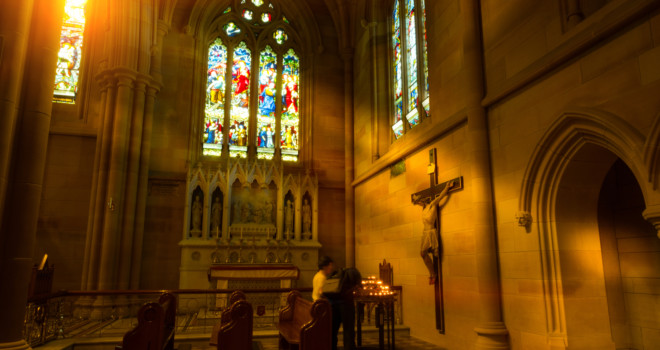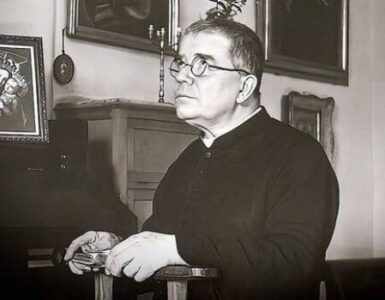The Facts of Life Series: Witnesses and Evangelists
In the early years after Jesus’ Resurrection and the establishment of the Church, God sent His selected disciples out to enlighten the known world and to preserve it. St. Paul comes to mind as does St. Peter. He called them and others to go far from home to share the Good News with those across the known reaches of the world of its day. And, He called others who were converted to the Faith, who had encountered God intellectually and emotionally, spiritually and practically to do the same right where they were. He does the same things even in our modern moment.
For most of us, we are the believers who stay at home. We are the believers with more commonplace careers, who take the Faith to work every day. We are those whose calling is of a smaller, but no less important, scale. We are those called to more routine vocations, within a more confined geography. And, we are those who’s calling to evangelize and embody the Faith will be observed and encountered in a regular and detailed manner virtually every day of our lives.
Most of us may never be called to give a sermon or make a formal presentation of our Catholic faith. Most of us may never teach adolescent or adult catechesis or speak to an RCIA class or present the faith at a meeting or conference. Most of us may never have a formal role in overtly sharing the Good News of Jesus Christ or the principles and substance of our Catholic religion. But, that does not mean we do not have a role to play in executing the Great Commission Jesus gave His disciples, His followers, His converts.
Actually, we all have a role to play in advancing the Great Commission. Every single one of us. In our homes, at our jobs, in our neighborhoods and communities and even in our parish, we are all responsible to embody and to share the Gospel message. Jesus makes this very clear. For He calls each of us to be the “salt,” the inspiring preservative of true truth, true goodness and true beauty to the greater world and to our fellow disciples.
As the salt of the Earth, we are truly the Gospel’s witnesses. We are the role models, the exemplars of the sum and substance of the meaning of life and the morality through which this meaning is manifest in us. As our daily lives, our personalities, our dispositions and our wisdom are conformed to the truth, goodness and beauty of God, we will inherently preserve and model, teach and inspire those who observe us with a curious and discerning eye. For we are witnesses to the Gospel for others to observe and to wonder, to analyze and to ponder.
And, we are called to be fearless, not anxious about this responsibility. For no one observing us expects perfection in all we do. Quite the opposite is often true. Some people will observe our quick admission of errors, our ready forgiveness of others, our kindness and openness to feedback to name just a few of the traits we can embody, even in our failings.
For we are each an individual whose traits and tendencies God had a hand in creating. Our unique nature can manifest such truth, goodness and beauty in a general discernible way without distorting how we may individually manifest these dimensions of life and living and who we are as individual sons and daughters of God.
This calling to be a true witness allows us to live fearlessly and passionately, spontaneously yet thoughtfully. We fare much better at living without the fear of failure and of sin. For we know God has and will forgive all our errors and our deficiencies, our excesses and our omissions. He is indeed our perfect Father, who is there to reprove us and to encourage us, to discipline us and to inspire us to try and try again. For God knows, many of us work and live better when we work with a net, when we know if we err, we will not be broken, but forgiven.
So, as witnesses to the Faith, as the preservative of mankind and its culture, we should be passionately persevering and determinedly developing into a clearer and more complete embodiment of life’s meaning, its joys and its richness. We should be becoming a clearer and more complete manifestation of true goodness and full forgiveness. And, we should be expanding our knowledge of the truth and our ability to explain it and to live it.
That is why we are also called to be the light of the world. We are the Truth’s beacon bearers to those who no longer see or believe in truth. To all those lost and confused, curious and wounded. And, we bear this truth implicitly by our very being as the preservative “salt” outlined above. But, we also bear it explicitly as we bring light to the world by speaking and explaining the truth of our Faith and its many derivative manifestations and implications.
For we are also all called to evangelism. We are all called to share the truth about God, the truth about life, the truth of virtue and beauty and love. We are all called to be a catalyst leading to conversion. We are to create curiosity in others, not just by our lives, but by our ideas and our values. We are to provoke others to reflect and even to criticize the Faith. But we must be ready to defend and to explain our beliefs and to prove their certainty.
For conversion necessitates unsettling other people’s comfortable conclusions. Conclusions that often make God a matter of personal belief and preference rather than a matter of fact. For either God exists or He doesn’t exist. And, personal belief has nothing to do with this question whatsoever. For the answer is a function of evidence. A function of proof, rational and scientific proof. And, as everyday evangelists, we should know how to communicate and prove the truth about God.
For evangelism, in most cases, requires challenging, discussing and debating conclusions contrary to the Faith. And it often starts right there with the question of God’s existence and questions about the very nature of God. Does God actually exist? And, if He does, what kind of God is He? And, what is His plan for all this? These are all crucial, necessary and fair questions. And each and every Catholic should be prepared to answer them thoroughly, effectively, and persuasively.
Also, effective evangelism relies on listening to what others believe and addressing those ideas and attitudes, those needs and issues they raise as barriers to the Faith. It also requires a thorough knowledge of basic apologetics and a general familiarity with the modern world’s erroneous thinking and ideas. Primarily, effective evangelism requires a familiarity with the soft-minded and silly suppositions inherent in our society’s worldview and in science’s exaggerated claims of certainty, as well as the fatal flaws of scientific materialism.
And, it requires a basic knowledge of the evidence for God’s existence, as well as other intangible facts such as reason and love, goodness and beauty. For effective evangelism appeals to our mind and our hearts, to life’s ultimate meaning and to life’s immediate experience, to profound ideas and practical problems. The appeal is to the head and the heart, the mind and the emotions.
For in the end, real evangelism is not just a conversion to a philosophy, an ethical system, a religious affiliation. It is all these and more. For God is not just content with these aspects of our knowledge and love for Him. He wants us to know and experience His love for us, personally and intimately. He wants us not to merely know about Him, but to know Him personally, even epiphanically. To experience first hand His being, His love.
So, as everyday evangelists, we are all called to stimulate others to seek salvation and intimacy with God, not just by the implicit witness of our lives and personalities. We are called to explicitly evangelize others we regularly and occasionally encounter in the daily activities of our lives. To that end, we are all called “to be ready to give an explanation to anyone who asks you for a reason for your hope.”
Being an implicit witness and an explicit evangelist are two aspects of our one calling. For we are both the “salt” and “light” of the world, the embodiment and articulation of the truth of God’s existence, His nature, His plan. For we are His emissaries and His missionaries to the world. But, even now, in our modern times, we do not labor alone. For He is with each of us until the very end of the age.
✠
This article is part of an extended series on the “The Facts of Life” by F. X. Cronin. You can start with part one by clicking here and see previous entries by clicking here.
We also recommend Mr. Cronin’s latest book, The World According to God: The Whole Truth About Life and Living. It is available from your favorite bookstore and through Sophia Institute Press.
image: iPhoto-Thailand / Shutterstock.com













